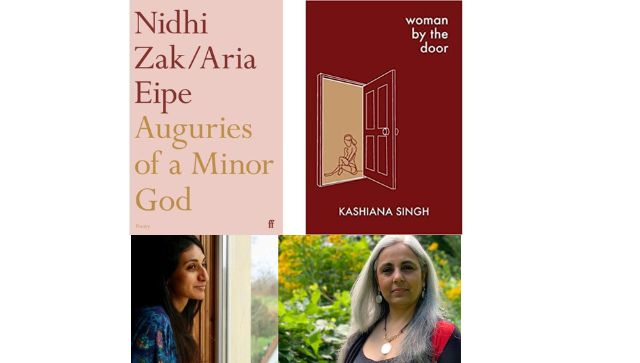Only a poem can illuminate a speck of life, unlike any other literary form. While there is no dearth of so-called ‘experimental’ poetry collections these days, it’s rare to find a volume that not only stands testimony to the above fact but is also entertaining and enchanting at the same time. Auguries of a Minor God (Faber & Faber, 2021) by Nidhi Zak/Aria Eipe is one such collection. A recipient of the Next Generation Artist Award in Literature from the Arts Council of Ireland and the inaugural Ireland Chair of Poetry Student Award, India-born Nidhi’s poetry collection has been on several prestigious literary prizes’ shortlist, most recently the 2022 Dylan Thomas Prize. In this book, which is divided into two parts, both uniquely structured, she takes inspiration from both Hindu scriptures in Sanskrit and the Holy Quran. While the first part ‘स्मरसि स्मर’ (Remember, Love?) is further divided into five sections (स्तम्भन [stunning/paralysing], शोषण [drying up/withering], सम्मोहन [bewildering/mesmerising], उन्मादन [bewitching/infatuating], and मारण [killing/destroying]) that are based on the god of desire Kamadeva’s five arrows, the second is a long poem — A is for العرب [Arabs] — whose pattern mimics Fibonacci sequence (0, 1, 1, 2, 3, 5, 8, 13, 21, 34…) in which the third item in the sequence is a sum of the previous two. As each one of Kamadeva’s arrows is made of a distinct flower and is known to have a unique effect, every poem in this collection’s first part leaves a distinct aftertaste. While the first ചുംബനം (Malayalam translation: ‘kiss’) tells you to give it back to the man “who doesn’t know / how to kiss you” is the simplest of all, as you progress through the collection you find that each word in these poems has been strategically placed and speaks to a distinct sensibility that can be fully appreciated only when you embrace the multiplicity of its rendering. Most of the poems frequently mention ‘horse’, whose presence in the Indian myth-history is well noted by Wendy Doniger in Winged Stallions and Wicked Mares: Horses in Indian Myth and History (Speaking Tiger, 2021). As I have read Doniger’s work, I could make connections and sense of the cultural myths borrowed from several Hindu scriptures that form the poem A Myth of Horses but had to rely on the Notes section towards the end to fully grasp others. This collection’s dizzying ferocity lies in the fact that it’s both playful and rule-bound. The mathematical precision and fluidity of language both converge wonderfully in this brilliant collection. You’re immediately pulled into the universe that these poems create. Be it the different shades of love it presents or the diversity of emotions it captures or the otherness that a Muslim feels in an increasingly divided world it depicts, Nidhi’s poems work as a conduit of communication between the lost world and the future that’s left to be imagined. While experiments triumph in Nidhi’s work, yet another India-born writer Kashiana Singh’s Woman by the Door (Apprentice House Press, 2022) explores the limits of liminality in her expertly but simple-crafted verses. Though there are several themes one can capture as each poem in this collection remember an era gone by or address pent-up feelings, its running theme for me is that of looking, bearing witness, and of documenting the lost and about-to-be lost. Divided into three parts — Apertures, Portals, and Detours, Woman by the Door is also an ode to the South Asian way of life: the families we live in, the relationships we celebrate, the festivals we observe, the bonds we let go of, and the patchwork we become late in our lives — a P&L statement of our collective existence. Most poems in this collection, right from the first one Homesick to In my Nani’s house, curds and whey were a religion to Eleven Photographs in Ma’s Kitchen, are brimming with nostalgia. Their emotive value far exceeds the joy of noticing their craft. Perhaps all parts are rightly named, for they not only act as doorways, providing you a sneak peek into someone’s most private, but they also depict the various degrees of pain that exposure to the love, loss, and longing can leave you with depending on your proximity to its subjects. While distance is key in some, an unforgettable memory from growing up years plays an instrumental role in others. Sample this: “I have tried so much to do what Nani did but the curd I make always looks like half-fulfilled wishes. As if it is telling me to have more patience, wants me to breathe in, breathe out and stir the silence.” Or this one, an excerpt from Windows and Rooms: “These cities emerge one by one from every unused corner between rooms. Each city a breath, transcreated into memories. Each memory shuffling through unborn time.” In this collection, Singh pays immense attention to the strangeness of familial relations. While in one a mother feels that her children “take[s] me through their lives” as if it were “a garage sale”, in the other she advises her son (or perhaps a grandson?) to “unbecome your father”. Besides that, a special effort can be sensed in the poet’s attempts to highlight how mortality makes its presence felt in our lives and the burden that memories become eventually. Saurabh Sharma (He/They) is a Delhi-based queer writer and freelance journalist. Read all the Latest News , Trending News , Cricket News , Bollywood News , India News and Entertainment News here. Follow us on Facebook, Twitter and Instagram.
While Nidhi Zak/Aria Eipe’s work triumphs the experimental, Kashiana Singh’s poetic universe reflects how love, loss, and longing make an unforgettable South Asian reality.
Advertisement
End of Article


)
)
)
)
)
)
)
)
)



